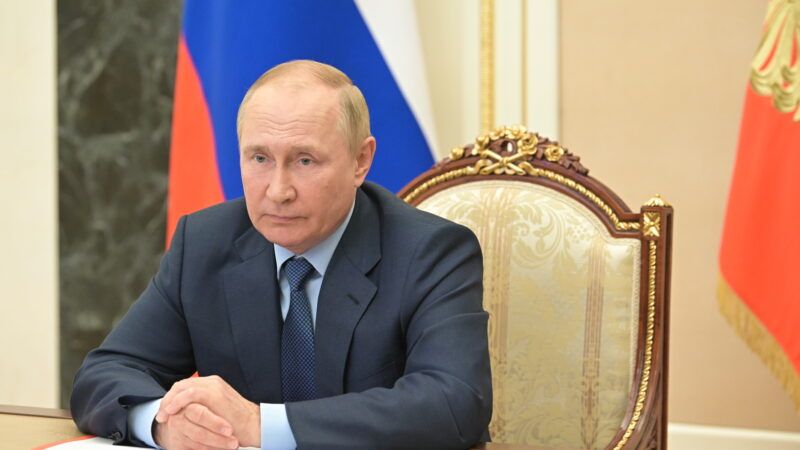Don't Let Russia's Regime Change Plans Draw the U.S. Into War
As appalling as the Russian foreign minister’s admission is, it does not change the reasons to avoid a war with Moscow.

Five months into its brutal war of aggression against Ukraine, the Russian government finally came clean: It wants regime change. "We are determined to help the people of eastern Ukraine to liberate themselves from the burden of this absolutely unacceptable regime," Russian Foreign Minister Sergey Lavrov said Sunday, draping conquest in the garb of freedom.
This is a new line from Moscow, in fact a reversal of its rhetoric earlier in the war. In March, for example, a representative of Lavrov's department conceded that the Kremlin wanted to keep Ukraine from joining NATO but denied any designs on Kyiv. Moscow's plans "do not include either the occupation of Ukraine or the destruction of its statehood," she said, "nor the overthrow of the current government" led by Ukrainian President Volodymyr Zelenskyy.
Now the pretense has fallen, and Lavrov's admission is sure to become a stock line in arguments for expanded U.S. military intervention in the conflict. Yet as appalling as Lavrov's comment is, it does not change any of the fundamental reasons to avoid a war between the United States and Russia.
Russian President Vladimir Putin launched his invasion with claims of self-defense. Allowing Ukraine to align more closely with the West, and particularly to join NATO, "would be an absolutely irresponsible thing to do for us," he said. "For our country, it is a matter of life and death, a matter of our historical future as a nation." If Russia did not preemptively assault Ukraine, Putin insisted, Russian culture would be destroyed; Ukraine would commit genocide against Russian-speaking people in the country's east; and Western nations would behave like the Nazis during appeasement. Attacking Ukraine, he insisted, was a defensive move.
Putin's narrative was never credible or even coherent, with or without this week's explicit embrace of regime change, and experts and officials in Washington and elsewhere have long recognized as much. The British government accused Russia of planning regime change all the way back in January. It's unlikely that Moscow would accept anything less, Alexandra Vacroux of the Davis Center for Russian and Eurasian Studies told The Harvard Gazette shortly after the war began, because "their objective is control over Ukraine. They tried to do it indirectly through pro-Russian politicians, and that didn't work. Now they're taking direct action to be sure that the person running Ukraine is going to be friendly."
In the months since, that action has proven a lot less direct than many anticipated. Within a matter of weeks, it became clear that Putin, like "many other would-be regime changers in history…underestimated the costs his regime change plan [would] require," argued security scholar at the Modern War Institute and my colleague at Defense Priorities, Benjamin Denison. And even if Russia were able to take Kyiv and overthrow the Ukrainian government, "that is just the beginning," Alexander B. Downes of George Washington University told The Washington Post.
"This is what regime changers don't look at," Downes said. "They focus on the short-term."
Undue focus on the short term—namely, the shock of Moscow copping to its flailing attempt at ousting Zelenskyy—is a risk for Washington too. American officials continue to be enthusiastic about providing a broad and steady flow of U.S. military support to Ukraine, including helping to kill Russian generals and sink a Russian ship. "I think we should do more," Rep. Michael Waltz (R–Fla.) proposed on Fox News this week, including having American "advisors in Ukraine helping their military with the planning and logistics" so Ukraine can "go for a win" and get "back to that 2014 line," which probably means reclaiming the Crimean peninsula from Russia's 2014 annexation. Rep. Mikie Sherrill (D-N.J.) similarly called for sending a U.S. "logistics officer" to coordinate weapons transfers.
Lavrov's remark will undoubtedly fuel more escalatory arguments, but it doesn't mark a real change in Russian policy. Nor does it negate the grave danger of the United States moving toward open war with Russia, a fellow nuclear power with whom our military is already operating in perilously close quarters in Syria. President Joe Biden was right to pledge, with a clarity too often lacking in his policy toward Ukraine, that the United States "will not be directly engaged in this conflict, either by sending American troops to fight in Ukraine or by attacking Russian forces." The Kremlin's decision to confess its aim of regime change doesn't make that promise any less wise. If anything, it's more important than ever.

Show Comments (64)